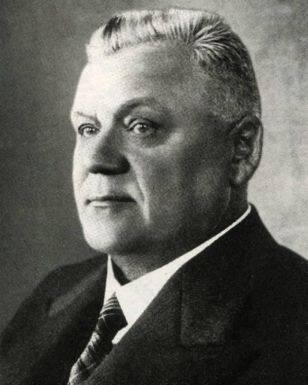Karlis Ulmanis
Baltijos šalių nepriklausomybė, II Antrasis pasaulinis karas
Latvijos prezidentas ir ministras pirmininkas (1936–1940). 1934 m. gegužės 15 d. Kārlis Ulmanis surengė valstybės perversmą, kuris Latvijoje pradėjo autoritarinio valdymo laikotarpį.
Jis ilgai dvejojo, buvo išskirtinai gabus politikas, pasižymėjęs geležine valia, milžiniška energija, organizaciniais ir organizaciniais gebėjimais, fanatiška meile darbui, kuklumu asmeniniame gyvenime, giliu ir nuoširdžiu patriotizmu. Jo pagrindiniai šūkiai buvo: „Vienybė, lyderystė, latviškumas“.
Kārlis Ulmanis gimė 1877 m. rugsėjo 4 d. Pikši parapijos namuose, Dubelės rajone, Udzes savivaldybėje. Jis mokėsi Bērmuižos pradinėje mokykloje, Jelgavos miesto Aleksandro mokykloje, Jelgavos realinėje mokykloje. 1896 m. jis baigė Jelgavos realinę mokyklą ir išvyko į Rytų Prūsiją mokytis pienininkystės Tapiavos (žymėta Guardejska) pieno mokykloje. 1897 m. dirbo pieno ūkio vadovu Rygoje, Krāsotāju gatvėje. 1902 m. kartu su J. Bergu vadovavo pienininkystės kursams Bērmuižoje. 1902–1903 m. studijavo Šveicarijos federaliniame politechnikos institute Ciuriche. 1903–1905 m. studijavo žemės ūkį Leipcigo universiteto Žemės ūkio institute, tuo pačiu metu vadovavo keliems pienininkystės kursams Latvijoje.
1905 m. gruodžio 21 d. jis buvo suimtas už dalyvavimą 1905 m. revoliucijoje ir išsiųstas į Pskovo kalėjimą. 1906 m. jis buvo paleistas iš kalėjimo, o 1907 m. pavasarį emigravo į Niujorką (JAV). Studijavo žemės ūkį keliose JAV kolegijų tipo įstaigose, tapo ūkio įmonės vadovu ir Nebraskos universiteto dėstytoju.
1918 m. lapkričio 17 d. jis išrinktas Latvijos Liaudies Tarybos ministru pirmininku. Lapkričio 18 d. Liaudies Taryba pavedė Ulmaniui sudaryti Ministrų kabinetą. Nuo lapkričio 18 d. iki gruodžio 19 d. – žemės ūkio ministras. Nuo 1918 m. lapkričio 19 d. iki 1919 m. liepos 13 d. – ministras pirmininkas. Siekiant apsaugoti Latvijos valstybingumą, prašoma Danijos, Švedijos ir Estijos vyriausybių pagalbos. Nuo 1919 m. liepos 14 d. iki rugsėjo 4 d. – žemės ūkio ministras, nuo 1919 m. liepos 14 d. iki gruodžio 8 d. – ministras pirmininkas.
1919 m. rugsėjį nepavyko pasikėsinti į K. Ulmanį. Nuo 1919 m. spalio 16 d. iki 1920 m. birželio 11 d. – karo ministras, nuo 1919 m. gruodžio 9 d. iki 1920 m. birželio 11 d. – ministras pirmininkas ir gynybos ministras. Nuo 1920 m. birželio 12 d. iki 1921 m. birželio 18 d. ministras pirmininkas buvo Kārlis Ulmanis. 1921 m. balandžio 27 d. – trečiasis išpuolis prieš Kārlį Ulmanį.
1922 m. birželio 18 d. K. Ulmanio iniciatyva įsteigtas Kultūros fondas. 1925 m. vasario 28 d. jam buvo įteiktas Pirmojo laipsnio Trijų žvaigždžių ordinas. Nuo 1925 m. rugsėjo 24 d. iki 1926 m. gegužės 6 d. – Ministras Pirmininkas. Nuo 1926 m. gegužės 7 d. iki gruodžio 18 d. – Užsienio reikalų ministras. Nuo 1931 m. kovo 27 d. iki gruodžio 5 d. ir nuo 1934 m. kovo 17 d. iki gegužės 15 d. – Ministras Pirmininkas ir užsienio reikalų ministras. Nuo 1934 m. gegužės 18 d. iki 1940 m. birželio 20 d. – Ministras Pirmininkas.
1934 m. gegužės 15 d. Ulmanis surengė valstybės perversmą. 1936 m. balandžio 11 d. ministras pirmininkas Kārlis Ulmanis perėmė Respublikos Prezidento pareigas, remdamasis 1936 m. kovo 12 d. įstatymu „Dėl Respublikos Prezidento pareigų vykdymo“.
1937 m. įsteigta Tėvynės premija. 1938 m. rugpjūčio 11 d. jam buvo įteiktas aukščiausios klasės Trijų žvaigždžių ordinas.
Ministras pirmininkas K. Ulmanis ėjo Latvijos prezidento pareigas iki Latvijos Respublikos okupacijos 1940 m. birželio 17 d. 1940 m. liepos 22 d. jis deportuotas į SSRS. Nuo 1940 m. liepos 29 d. iki 1941 m. gegužės mėn. jis kalėjo Vorošilovske, specialiai įrengtame dvare. 1941 m. liepos 4 d. už kontrrevoliucinę veiklą prieš tarptautinį komunistinį judėjimą Ulmanis buvo sovietų valdžios suimtas ir uždarytas į Valstybės saugumo administracijos vidaus kalėjimą Ordžinikidzės rajone. 1942 m. rugsėjo 8 d. jis buvo išvežtas į Krasnovodską, Turkmėnijos SSR. 1942 m. rugsėjo 14 d. jis buvo patalpintas kalėjimo ligoninėje.
Mirė 1942 m. rugsėjo 20 d. Krasnovodsko kalėjime. Pasak liudininkų, palaidotas Krasnovodsko kapinėse.
Daugiau informacijos šaltinių
Kārlis Ulmanis laikinai einantis prezidento pareigas 1936–1940 m. | Latvijos prezidento kanceliarija (prezident.lv)
Susijusi laiko juosta
Susijusi istorija
Karlio Ulmanio nužudymo memorialas
1920 m. balandžio 15 d. buvo pasikėsinta pasikėsinti į tuometinį Latvijos ministrą pirmininką Kārlį Ulmanį, kai šis važiavo automobiliu miškingoje vietovėje Lubanos–Dzelzavos plente. Šioje vietoje, tarp Dzelzavos ir Indranų valsčių ribos, 1939 m. rugpjūčio 11 d. buvo įrengta atminimo lenta.
1917 m. kovas – svarbus mėnuo Valmieros ir Latvijos istorijoje
1917 m. kovo mėn., likus daugiau nei metams iki Latvijos valstybės paskelbimo, Valmieroje buvo įkurta Vidžemės laikinoji žemės taryba, kuri priėmė rezoliuciją dėl Latvijos autonomijos ir apsisprendimo teisių. Tarybos įkūrimo dieną posėdžių vietoje pirmą kartą buvo iškelta raudonai baltai raudona vėliava.
Cėsių mūšio pradžia, eiga ir pabaiga
Pergalė Cėsių mūšyje turėjo tapti lūžio tašku Latvijos ir Estijos kovoje už savo šalies nepriklausomybę. Ši pergalė sustabdė Andrijevo Niedros vyriausybės ir vokiečių generolo Rüdigerio fon der Golco planus užkariauti Pabaltijį. Vietoj to, Liepojoje savo veiklą atnaujino Karlio Ulmanio vadovaujama Laikinoji Latvijos vyriausybė.
Generolo Janio Baložo gyvenimas po grįžimo iš tremties
Kai 1940 m. rusai bandė išspausti iš Latvijos vyriausybės palankią karinės bazės sutartį, kuri būtų beveik neįmanomą Latvijos armijos gebėjimą pasipriešinti Raudonajai armijai, generolas J. Balodis bandė gauti kai kurias sutarties pataisas. Tačiau tai nepavyko. Tačiau generolo priešininkai pasinaudojo šia aplinkybe, kad vėliau J. Balodį paverstų beveik išdaviku. Po konflikto su ministru pirmininku ir valstybės ministru K. Ulmaniu generolas 1940 m. balandžio 5 d. buvo atleistas iš karo ministro pareigų. Tuomet J. Balodis nusprendė dalyvauti Saeimos rinkimuose iš Demokratinio bloko, tačiau nieko iš to neišėjo, nes rinkimuose buvo leista dalyvauti tik vienam sąrašui – komunistų kandidatų sąrašui. Latvija tapo 14-ąja sovietine respublika.
Dėl Latvijos okupacijos
1940 m. nepriklausomos Latvijos valstybės egzistavimą nutraukė Sovietų Sąjungos okupacija ir aneksija, arba inkorporacija, į Sovietų Socialistinių Respublikų Sąjungą (SSRS).
Iš Ádolfo Erso knygos „Vidzemė kovoje už laisvę“ apie pabėgėlių kelionę Valkoje
Nuo pabėgėlių laikų Valkai buvo skiriamas svarbesnis vaidmuo nei kitiems Vidžemės miestams, nes čia buvo leidžiamas politiškai aktyvus laikraštis „Līdums“, kuriame buvo kaldinami Latvijos dvasiniai ir politiniai ginklai, taip pat todėl, kad tai buvo kryžkelė, kurioje susitiko keliai iš trijų Latvijos pusių: iš Rygos, Alūksnės, Mozekilės, taip pat iš Estijos ir Rusijos. Ji turėjo ryšių su pabėgėliais iš visų pusių – Tartu, Pliskos, Maskvos ir Sankt Peterburgo. Čia buvo didelis pabėgėlių centras.






